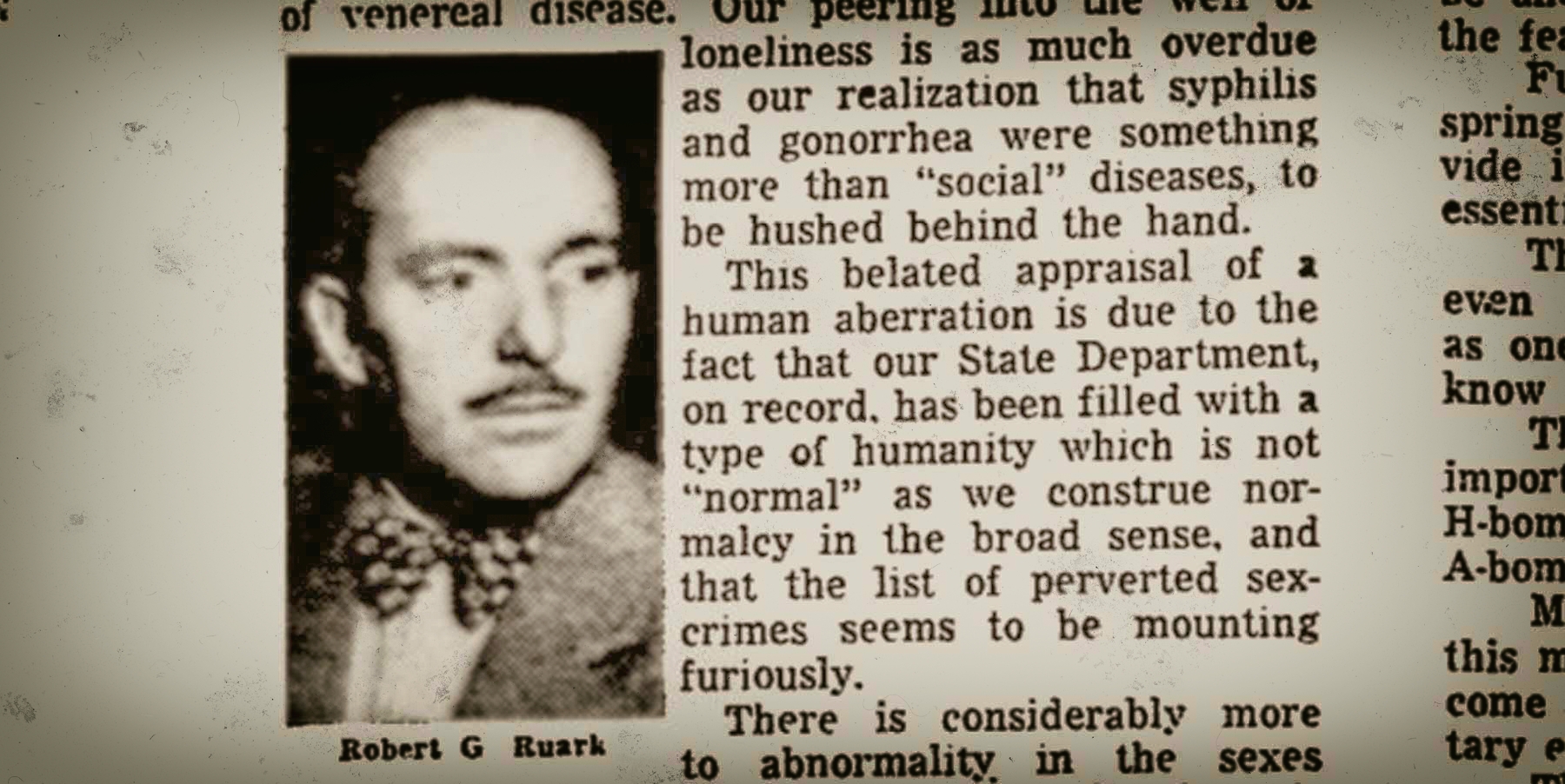 Novelist and columnist Robert C. Ruark was a sort of a poor-man’s Hemingway. He was proud of his humble North Carolina roots. But he also cultivated a worldly air through his international travels and an adventurer’s reputation as an African big game hunter. From his perch at the Washington Daily News, his column went out to about 180 newspapers in the Scripps-Howard chain. He didn’t indulge in politics very much. “I’m a political eunuch,” he once said, “and I don’t evaluate myself as a heavy thinker.”
Novelist and columnist Robert C. Ruark was a sort of a poor-man’s Hemingway. He was proud of his humble North Carolina roots. But he also cultivated a worldly air through his international travels and an adventurer’s reputation as an African big game hunter. From his perch at the Washington Daily News, his column went out to about 180 newspapers in the Scripps-Howard chain. He didn’t indulge in politics very much. “I’m a political eunuch,” he once said, “and I don’t evaluate myself as a heavy thinker.”
But in 1950, he was among a handful of columnists who picked up and amplified the February 28 revelation that the State Department had let go 91 homosexuals since 1947. The first major columnist to turn the revelation into a national crusade appears to have been George E. Sokolsky, whose March 21 column warned about homosexuals “accustomed to secrecy, conspiracy, lying” who are “always subject to blackmail.”
Two days after that, Ruark publish the first of two columns with his own set of warnings. Interestingly, Ruark works the “travel-in-packs” canard to asserts that all ninety-one homosexuals fired from the State Department were all hired by one man and his homosexual underlings. Rourk doesn’t say this, but the rumors floating around Washington are that this one man doing all the hiring was Sumner Welles, F.D.R’s close friend and de-facto foreign minister since Roosevelt took office in 1933. Officially, Welles was undersecretary to Cordell Hull, Roosevelt’s political appointee as Secretary of State. Hull, a Democratic Senator from Tennessee, was chosen more for his political connections to the southern wing of the Democratic party. It was Welles who had the President’s ear and who shaped American’s foreign policy, much to Hull’s anger.
That anger turned to disgust (and opportunity) when Welles made some inappropriate propositions to two Pullman porters during a political trip to Alabama. Hull tried to convince the newspapers and key Senators to open an investigation and instigate a scandal. Nobody took the bait, but Hull succeeded in forcing F.D.R. to demand his close friend’s resignation in 1940. The papers reported the resignation as the result of a power struggle between Hull and Welles, but the Washington press corps knew the whole back story. So when Ruark writes, “I know the story of the highly-placed State Department executive who crowded the lists with so many homosexuals…” — this is what he is talking about.
Let’s Spin a Yarn
Robert C. Ruark
Looks like a new point in journalism has finally been reached, at which it is possible to face the problem of homosexuality and perversion with the same honesty it too us so long to win in the case of venereal disease. Our peering into the well of loneliness is as much overdue as our realization that syphilis and gonorrhea were something more than “social” diseases, to be hushed behind the hand.
This belated appraisal of a human aberration is due to the face that our State Department, on record, has been filled with a type of humanity which is not “normal” as we construe normalcy in the broad sense, and that the list of perverted sex-crimes seems to be mounting furiously.
There is considerably more to abnormality in the sexes than a simple negation of boy-meets girl. There is a great difference between homosexuality and perversion. The homosexual in a simpler sense is less dangerous than he is irresponsible. The pervert is always potentially dangerous to the world around him, because his odd sexual leanings creep easily into vicious criminality with innocent victims.
Divergents from the sexual norm are pitiable, and in general live a life of mental and spiritual torture, full of frustration and persecution. Their residence in a minority group makes them subject to censure by the majority, and leads them to a life in shadow.
This creates a constant nervousness that pays off in panic. Most “queers” eventually acquire a tendency to hysteria, which means they blow their tops in time of stress. Since they also must hide from the world that outweighs them — since they must always mask their activities with stealth and secrecy — they’re forever open to apprehension.
A pervert fondles a child. The child cries. The creep blows his roof. He is panic-ridden and hysterically afraid of being caught. He throttles the child. A homosexual — possibly even a “happily” married one — is suddenly confronted with public awareness of his abnormal outcroppings. His position, his job, his very life is at stake. He blows his top. He has three choices. He can kill himself, kill his discoverer, or submit to blackmail.
In the loneliness that cloaks a homosexual, that places him basically apart from his fellow, his scarred soul calls out for company. So his inclination is to surround himself with his like. Homosexuals travel in packs, as do most divergents from an accepted status.
It is all well to say that a man must live his own life and in the manner which best suits him, but in government which is operated for the greatest good of the greatest number a dissenter from accepted behavior is a great liability. The drunkard, the boss who chases every stenographer, the sexual degenerate or homosexual all have a gaping chink in their behavioristic armor. This leads almost invariably to erratic action, neglect of job, and ever to blackmail. Always to blackmail.
When a man or woman is susceptible to easy blackmail, he is a tremendous risk in a position of trust. I know the story of the highly-placed State Department executive who crowded the lists with so many homosexuals that 91 resignations or firings have recently resulted. His appointees surrounded themselves with their appointees, and on down the line. What you have finally is a corroded organization which can be bribed, bullied or blackmailed in the easiest possible fashion.
Homosexuality has figured, off stage, in one of our traitorous operations. Homosexuality and similar irresponsibility has weakened us all over the world through the State Department’s calm acceptance of abnormality. A great deal of the trouble we are in, internationally, can be laid to the tolerance of that kind of weakness in a service which should be above reproach. You can say that the queer ones are pathetic and deserve a right to pursue happiness in most businesses, but you don’t need them in positions of heavy trust. I have some case histories tomorrow.
Epilogue:
The following day, Ruark published his description of traveling to North Africa in the company of State Department employees.
On the Timeline:
Previously:
![]() Feb 20, 1950: McCarthy links homosexuality and Communism.
Feb 20, 1950: McCarthy links homosexuality and Communism.
![]() Feb 27, 1950: Commerce Department official says no homosexuals have been dismissed from the department.
Feb 27, 1950: Commerce Department official says no homosexuals have been dismissed from the department.
![]() Feb 28, 1950: The State Department reports dismissing 91 homosexuals.
Feb 28, 1950: The State Department reports dismissing 91 homosexuals.
![]() Mar 14, 1950: McCarthy names five “bad security risks,” including one homosexual.
Mar 14, 1950: McCarthy names five “bad security risks,” including one homosexual.
![]() Mar 21, 1950: Columnist George E. Sokolsky says homosexuals are “advantageously stationed” in the State Department.
Mar 21, 1950: Columnist George E. Sokolsky says homosexuals are “advantageously stationed” in the State Department.
This story:
![]() Mar 23, 1950: Robert C. Ruark’s column warns of homosexuals “traveling in packs.”
Mar 23, 1950: Robert C. Ruark’s column warns of homosexuals “traveling in packs.”
Next:
![]() Mar 24, 1950: Robert C. Ruark follows up with “a drunk, a homosexual, and a flagrant fool.”
Mar 24, 1950: Robert C. Ruark follows up with “a drunk, a homosexual, and a flagrant fool.”
![]() Mar 24, 1950: Westbrook Pegler says homosexuals in government weren’t a problem before FDR.
Mar 24, 1950: Westbrook Pegler says homosexuals in government weren’t a problem before FDR.
![]() Mar 31, 1950: Rep. Arthur L. Miller gives “the putrid facts about homosexuality.”
Mar 31, 1950: Rep. Arthur L. Miller gives “the putrid facts about homosexuality.”
![]() Apr 14, 1950: Westbrook Pegler agrees that “homosexualism is worse than Communism.”
Apr 14, 1950: Westbrook Pegler agrees that “homosexualism is worse than Communism.”
![]() Apr 14, 1950: GOP Senator says McCarthy should attack homosexuals instead of Communists.
Apr 14, 1950: GOP Senator says McCarthy should attack homosexuals instead of Communists.
![]() Apr 18, 1950: GOP Chairman warns of “perverts who have infiltrated our government.”
Apr 18, 1950: GOP Chairman warns of “perverts who have infiltrated our government.”
Periscope:
For March 23, 1950:
| President: | Harry S. Truman (D) | |||
| Vice-President: | Alben W. Barkley (D) | |||
| House: | 262 (D) | 168 (R) | 2 (Other) | 3 (Vacant) |
| Southern states: | 102 (D) | 2 (R) | 1 (Vacant) | |
| Senate: | 54 (D) | 42 (R) | ||
| Southern states: | 22 (D) | |||
| GDP growth: | 7.3 % | (Annual) | ||
| 3.0 % | (Quarterly) | |||
| Fed discount rate: | 1½ % | |||
| Inflation: | -0.8 % | |||
| Unemployment: | 6.3 % | |||

Headlines for March 23, 1950: McCarthy accuses Truman of “arrogant refusal” to release State Department’s loyalty files. State Department denies McCarthy’s charges of employing a “top Russian spy”. Conditions in Southeast Asia deemed “extremely critical” because of Communist military successes in China. Peiping radio admits famine is spreading across eastern, central and southern provinces of China. Gen. Eisenhower warns that defense cuts have gone too deep. Thousands of Belgians riot over the return of King Leopold III. B-50 bomber explodes over Arizona; 12 killed, 2 parachute to safety.
 In the record stores: “Chattanoogie Shoe Shine Boy” by Red Foley, “Music! Music! Music! (Put Another Nickel In)” by Teresa Brewer and the Dixieland All-Stars, “Rag Mop” by the Ames Brothers, “The Cry of the Wild Goose” by Frankie Lane, “There’s No Tomorrow, by Tony Martin, “Dear Hearts and Gentle People” by Bing Crosby, “I Said My Pajamas” by Tony Martin and Fran Warren, “I Can Dream, Can’t I?” by the Andrew Sisters, “It Isn’t Fair” by Don Cornell and the Sammy Kaye Orchestra, “Chattanoogie Shoe Shine Boy” by Bing Crosby with Vic Schoen & His Orchestra.
In the record stores: “Chattanoogie Shoe Shine Boy” by Red Foley, “Music! Music! Music! (Put Another Nickel In)” by Teresa Brewer and the Dixieland All-Stars, “Rag Mop” by the Ames Brothers, “The Cry of the Wild Goose” by Frankie Lane, “There’s No Tomorrow, by Tony Martin, “Dear Hearts and Gentle People” by Bing Crosby, “I Said My Pajamas” by Tony Martin and Fran Warren, “I Can Dream, Can’t I?” by the Andrew Sisters, “It Isn’t Fair” by Don Cornell and the Sammy Kaye Orchestra, “Chattanoogie Shoe Shine Boy” by Bing Crosby with Vic Schoen & His Orchestra.

On the radio: Lux Radio Theater (CBS), Jack Benny Program (CBS), Edgar Bergan & Charlie McCarthy (CBS), Amos & Andy (CBS), Arthur Godfrey’s Talent Scouts (CBS), My Friend Irma (CBS), Walter Winchell’s Journal (ABC), Red Skelton Show (CBS), You Bet Your Life (NBC), Mr. Chameleon (CBS).
On television: The Lone Range (ABC), Toast of the Town/Ed Sullivan (CBS), Studio One (CBS), Captain Video and his Video Rangers (DuMont), Kraft Television Theater (NBC), The Goldbergs (CBS), Arthur Godfrey’s Talent Scouts (CBS), Candid Camera (NBC), Texaco Star Theater/Milton Berle (NBC), Hopalong Cassidy (NBC), Cavalcade of Stars/Jackie Gleason (DuMont), Meet the Press (NBC), Roller Derby (ABC).
New York Times best sellers: Fiction: The Parasites by Daphne du Maurier, The Egyptian by Mika Waltari, The King’s Cavalier by Samual Shellabarger. Non-fiction: The Mature Mind by H.A. Overstreet, This I Remember by Eleanor Roosevelt, Home Sweet Zoo by Clare Barnes.
Sources:
Robert C. Ruark. Washington Daily News (March 23, 1950); as it appeared in “Let’s Spin a Yarn.” Reading (PA) Eagle (March 23, 1950): 10.
David K. Johnson. The Lavender Scare: The Cold War Persecution of Gays and Lesbians in the Federal Government. (Chicago: University of Chicago Press, 2004): 65-67.
![[Emphasis Mine]](http://jimburroway.com/wp-content/uploads/2018/01/Lesbians.jpg)
